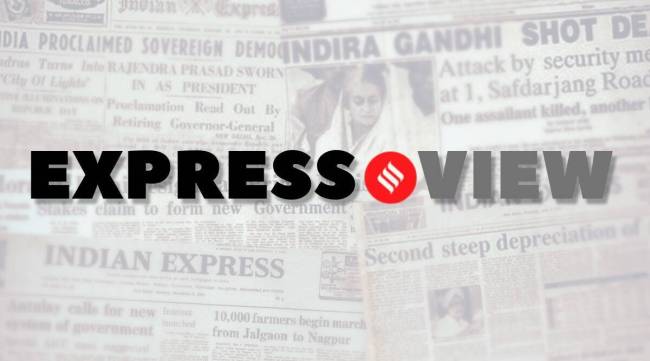Opinion Express View: Obsession with Khalistan seethes at the margins of Sikh diaspora, finds little resonance in Punjab
It was Punjab's youth that paid the highest price during the years of militancy and many in the state today have not forgotten that dark chapter.
 Delhi is right to demand action against these groups, but at the same time, it must be careful not to put these episodes at the centre of bilateral ties with countries that have large Sikh diasporas.
Delhi is right to demand action against these groups, but at the same time, it must be careful not to put these episodes at the centre of bilateral ties with countries that have large Sikh diasporas. The incidents of denigration of the Indian flag and vandalising of Indian diplomatic missions instigated by Khalistani activists and sympathisers in foreign capitals says more about the Sikh diaspora, or a small section of it, than it does about Punjab. Today, there is little or no support for the idea of Khalistan in Punjab. True, the state has its problems — the plateau and dead-ends of an unsustainable rice-wheat agricultural economy amid shrinking landholdings; declining prospects for employment generation; a widespread problem of addiction to alcohol and drugs in the young; a neighbour on the state’s international border ever willing to stir up trouble; and the political short-termism of ruling elites. But Punjab knows only too well that Khalistan has zero answers to any of these questions and problems. The people want no repeat of the violence that raged in the state in the 1980s until the mid-1990s because of an armed uprising by Sikh militants, and the challenge posed by a movement fanned and fuelled by Pakistan’s ISI to the Indian state. It was Punjab’s youth that paid the highest price, and many in the state today have not forgotten that dark chapter.
In the context of the high drama playing in the state over the self-styled leader of the mysterious group Waris Punjab De, Amritpal Singh, the incident in London, where Khalistani activists replaced the Tricolour at the Indian High Commission with their own flag, the vandalism at the Indian consulate in San Francisco, and the protests at Surrey in Canada’s British Columbia leading to the cancellation of the Indian envoy’s participation in an event there, underline that Khalistan persists as a fantasy only for those who have few if any stakes in Punjab. It attracts those whose own young have to make no sacrifices, pay none of the price demanded by a violent separatist movement. Within the diaspora, the obsession with an idea that was politically defeated long ago appears to be a preoccupation of fringe elements, not the larger Sikh community settled in those countries.
Delhi is right to demand action against these groups, but at the same time, it must be careful not to put these episodes at the centre of bilateral ties with countries that have large Sikh diasporas. As open multicultural democracies, Canada, Britain and the US have for over a century welcomed immigrants, promising them equal rights and citizenship. It is possible that some may harbour anti-India views, and may propagate these from time to time. But the foreign relations of an increasingly mature and sure-footed power cannot be hostage to such aberrations.






